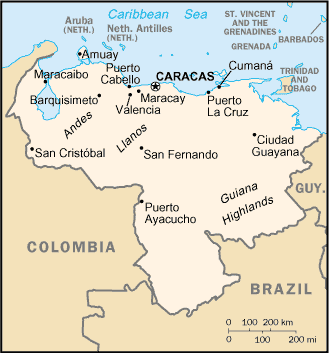Capital: Caracas
Population: 25.7 million (UN, 2003)
Year of Independence: 1811, from Spain
Type of Government: Federal Republic
GNP: $146.2 billion (2001 est.)
Natural Resources: petroleum, natural gas, iron ore, gold, bauxite, other minerals, hydropower, diamonds
Political Parties: Democratic Action (AD); Fifth Republic Movement (MVR); Homeland for All (PPT); Justice First; Movement Toward Socialism (MAS); National Convergence (Convergencia); Radical Cause (La Causa R); Social Christian Party (COPEI); Venezuela Project (PV)
Part of Colombia until 1830, Venezuela has rich supplies of natural resources, including thousands of kilometers of wilderness and rain forest. The constant development of this wilderness has endangered this resource and the people that live within it. The most profitable resource, oil, has proved a mixed blessing for Venezuela’s recently fluctuating economy, comprising around 80 percent of the country’s income from exports. Once considered highly stable, Venezuela currently faces serious threats from this dependence on oil, due to falling prices and currency depreciation. Official and institutionalized corruption has dominated the country’s economy and political system during democratic rule since 1961. As much as 85 percent of the population lives in poverty, a testament to how its wealth lies in the hands of a few powerful people. President Hugo Chávez has fought against these and other difficulties since his election into office in 1998, hard-won against the corrupted political system. The recent problems have resulted in a loss of support from all sides for Chávez, and several political showdowns inside the government. In late 2002 and early 2003, Venezuela was debilitated by a general strike that threatened the Chávez presidency. Oil workers continued to strike after other workers returned to the job, and the country briefly saw a heavy loss in revenues. Chávez survived the crisis, but his popularity suffered in the process.
- Previous: Uruguay



